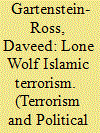|
|
|
Sort Order |
|
|
|
Items / Page
|
|
|
|
|
|
|
| Srl | Item |
| 1 |
ID:
132372


|
|
|
|
|
| Publication |
2014.
|
| Summary/Abstract |
Lone-wolf terrorism is a threat to the security of modern society, as was tragically shown in Norway on July 22, 2011, when Anders Behring Breivik carried out two terrorist attacks that resulted in a total of 77 deaths. Since lone wolves are acting on their own, information about them cannot be collected using traditional police methods such as infiltration or wiretapping. One way to attempt to discover them before it is too late is to search for various "weak signals" on the Internet, such as digital traces left in extremist web forums. With the right tools and techniques, such traces can be collected and analyzed. In this work, we focus on tools and techniques that can be used to detect weak signals in the form of linguistic markers for potential lone wolf terrorism.
|
|
|
|
|
|
|
|
|
|
|
|
|
|
|
|
| 2 |
ID:
142096


|
|
|
|
|
| Summary/Abstract |
This article explores how terrorists acting alone or in small groups have used sports events as symbolic targets in their performance of terrorism. Drawing on a comparative analysis of the attacks on the 1996 Atlanta Olympic Games and the 2013 Boston Marathon, it is argued that terrorist target selection of major sports events should be understood in relation to the grievances and desires of the perpetrators. The article finds that rather than being the primary target of their attacks, sports events are among a broader range of densely crowded spaces that terrorist actors may seek to target as part of their violent struggle against their adversaries. The findings are contextualized in relation to broader patterns and trends in lone wolf terrorism, including the significance of a copycat phenomenon and inspiration effect.
|
|
|
|
|
|
|
|
|
|
|
|
|
|
|
|
| 3 |
ID:
098888


|
|
|
|
|
| Publication |
2010.
|
| Summary/Abstract |
Lone wolf terrorism remains an ambiguous and enigmatic phenomenon. The boundaries of lone wolf terrorism are fuzzy and arbitrary. This article aims to define and analyze the main features and patterns of lone wolf terrorism in fifteen countries. Lone wolf terrorism is shown to be more prevalent in the United States than in the other countries under study. The cross-national analysis suggests that in the United States lone wolf terrorism has increased markedly during the past three decades; a similar increase does not appear to have occurred in the other countries under study. The numbers of casualties resulting from lone wolf terrorism have been relatively limited, and there is no evidence that the lethality of lone wolf terrorism is on the increase. The rates of psychological disturbance and social ineptitude are found to be relatively high among lone wolf terrorists. Lone wolf terrorists tend to create their own ideologies that combine personal frustrations and aversion with broader political, social, or religious aims. In this process, many lone wolf terrorists draw on the communities of belief and ideologies of validation generated and transmitted by extremist movements.
|
|
|
|
|
|
|
|
|
|
|
|
|
|
|
|
| 4 |
ID:
137165


|
|
|
| 5 |
ID:
132366


|
|
|
|
|
| Publication |
2014.
|
| Summary/Abstract |
This article is a detailed case study examining Abdulhakim Mujahid Muhammad (born Carlos Bledsoe), a lone wolf jihadist who carried out a fatal shooting at a joint Army-Navy recruiting center in Little Rock, Arkansas, on June 1, 2009. The article explores his early life, including involvement in violent and criminal activities that caused Muhammad to get into trouble with authorities, after which he decided to explore religion as an alternative that could keep him out of trouble. Muhammad found that he was attracted to the Islamic faith, and converted at the age of nineteen. The article explores Muhammad's subsequent turn toward Salafism, and chronicles his increasing extremism with reference to academic debates about the concept of radicalization and the role of religious ideas. Finally, the article explains Muhammad's attack on the recruiting center, and the manner in which he was able to continue his jihad even while imprisoned.
|
|
|
|
|
|
|
|
|
|
|
|
|
|
|
|
| 6 |
ID:
144883


|
|
|
|
|
| Summary/Abstract |
In “Key Issues and Research Agendas in Lone Wolf Terrorism,” published in Issue 3 of 2015, Ramón Spaaij and Mark S. Hamm (hereafter SH) mount an extended critique of the field of lone wolf terrorism studies, arguing that it suffers from significant definitional, methodological, and inferential issues. They are particularly critical of my article, “Explaining Lone Wolf Target Selection in the United States,” arguing that it “brings into sharp relief a number of key issues regarding the quality and rigor of lone wolf terrorism research.” This article, which analyzed a database of 84 lone wolf attacks that took place in the United States between 1940 and 2012, had three main findings regarding the process by which American lone wolves choose targets: (1) that lone wolves are constrained by their relative weakness compared to violent organizations, and must thus select “softer,” usually civilian targets; (2) that this relative weakness also drives them to use firearms, mainly, as the weapon of choice; and (3) that lone wolves choose targets at the intersection of their daily routines—for example, the route they take to and from work—and the ideology that they claim drives their behavior. For example, antigovernment lone wolves tend to select targets symbolic of government—monuments, courthouses, and so on—that are located in familiar areas. SH do not, in general, dispute these findings, but rather call into question the validity of some of the methods and approaches used to arrive at them.
|
|
|
|
|
|
|
|
|
|
|
|
|
|
|
|
| 7 |
ID:
132363


|
|
|
|
|
| Publication |
2014.
|
| Summary/Abstract |
Research has shown that there is no profile of individual characteristics of group-based terrorists, but profiling the characteristics of lone wolf terrorists may yet be possible. In this article, we bring together suggestions about what a lone wolf profile might look like. We describe a two-pyramids model that distinguishes radicalization of opinion from radicalization of action, then use this model to review three case histories of lone wolf terrorists. We also review results comparing two kinds of mostly lone actor violent offenders: assassins and school attackers. Results highlight the gap between radical opinion and radical action, and suggest two profiles of lone wolf terrorists: disconnected-disordered are individuals with a grievance and weapons experience who are social loners and often show signs of psychological disorder; caring-compelled are individuals who strongly feel the suffering of others and feel a personal responsibility to reduce or avenge this suffering.
|
|
|
|
|
|
|
|
|
|
|
|
|
|
|
|
|
|
|
|
|